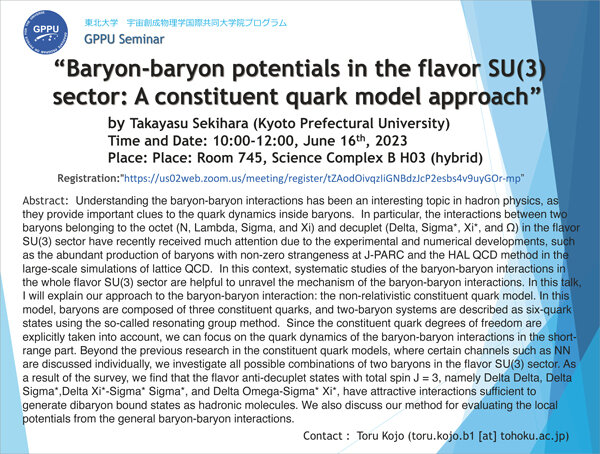NEWS
GP-PU Seminar: "Baryon-baryon potentials in the flavor SU(3) sector: A constituent quark model approach"
Time and Date
10:00-12:00, June 16th, 2023
Title
"Baryon-baryon potentials in the flavor SU(3) sector: A constituent quark model approach"
by Takayasu Sekihara (Kyoto prefectural University)
Place (hybrid)
Room 745, Science Complex B (MAP H-03)
Zoom registration for participants:
https://us02web.zoom.us/meeting/register/tZAodOivqzIiGNBdzJcP2esbs4v9uyGOr-mp
Abstract
Understanding the baryon-baryon interactions has been an interesting topic in hadron physics, as they provide important clues to the quark dynamics inside baryons. In particular, the interactions between two baryons belonging to the octet (N, Lambda, Sigma, and Xi) and decuplet (Delta, Sigma*, Xi*, and Ω) in the flavor SU(3) sector have recently received much attention due to the experimental and numerical developments, such as the abundant production of baryons with non-zero strangeness at J-PARC and the HAL QCD method in the large-scale simulations of lattice QCD. In this context, systematic studies of the baryon-baryon interactions in the whole flavor SU(3) sector are helpful to unravel the mechanism of the baryon-baryon interactions. In this talk, I will explain our approach to the baryon-baryon interaction: the non-relativistic constituent quark model. In this model, baryons are composed of three constituent quarks, and two-baryon systems are described as six-quark states using the so-called resonating group method. Since the constituent quark degrees of freedom are explicitly taken into account, we can focus on the quark dynamics of the baryon-baryon interactions in the short-range part. Beyond the previous research in the constituent quark models, where certain channels such as NN are discussed individually, we investigate all possible combinations of two baryons in the flavor SU(3) sector. As a result of the survey, we find that the flavor anti-decuplet states with total spin J = 3, namely Delta Delta, Delta Sigma*,Delta Xi*-Sigma* Sigma*, and Delta Omega-Sigma* Xi*, have attractive interactions sufficient to generate dibaryon bound states as hadronic molecules. We also discuss our method for evaluating the local potentials from the general baryon-baryon interactions.
Point
GASP 1
Contact
Toru Kojo (Physics, GP-PU),
E-mail: toru.kojo.b1 * tohoku.ac.jp (Replace * with @)

Posted on:June 1, 2023




